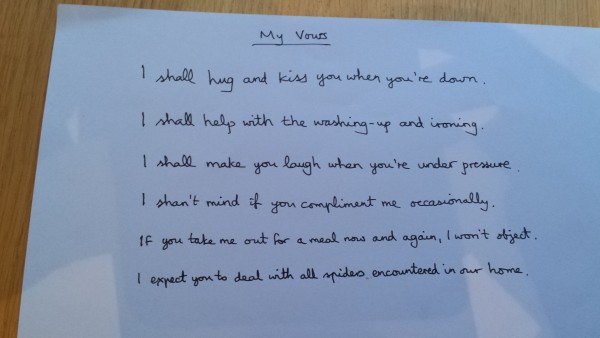If you’re the bride or groom, all eyes are going to be on you on the big day. It’s normal. You’re almost guaranteed to be nervous – and that’s also normal. But what if you’ve got to recite your own vows too? And what if they’re vows you’ve written yourselves?
As if the whole thing is not already stressful enough, we’re dealing with emotive issues here.
Wow! No wonder all but the most accomplished and experienced public-speakers feel deterred!
Fortunately, although some adrenaline is inevitable and actually healthy, the terror can be removed relatively simply.
Writing the Vows

The secret lies in good preparation, starting with the vows themselves.
Don’t feel you have to write pages and pages. As long as what you say is sincere, a couple of sentences might well suffice. I’ve heard some beautiful vows that have lasted just half a minute or so.
That isn’t to say that writing vows that last 30 seconds is easy. However, if you’re able to do this (and your civil celebrant will surely be willing to guide you), the effects can be wonderful.
Here is an example:
Sandy, you mean everything to me. You are my best friend. I know I can fall back on you in hard times, share a drink with you at any time, that you will make me feel better when I’m down, and share in my happiness when things are good. I promise to respect and care for you for the rest of my life. I know how blessed I am to be together with you. Thank you for being you.
If you feel that you’re short-changing your loved one because your vows seem rather short, you can always write a letter with expanded vows, hand it over, and it can be read privately later. A bonus love letter!
Reciting the Vows
Obviously, having short vows makes the recital a little less nerve-wracking.
However, you don’t need to rely on memory (in fact, it’s probably safer not to). That way, you’re not worrying about what you’re supposed to be saying. If you read from a card, you can be more relaxed, make eye contact with your beloved, and say it as if you mean it. (And you do!)
I would still recommend plenty of practice (aloud, and possibly in front of at least one other person). If you do practise, you may then be able to use your card or paper merely as a crutch, and avoid reading word-for-word.
As a last resort, you can give your civil celebrant your words to read, for you to repeat.
Presenting your Vows
You are saying these words to your beloved, and that is the person who absolutely has to be able to hear them. However, you may manage to speak slowly and to project your voice, then it would be wonderful if your guests can hear what you have to say.
The advantage of addressing your words directly to your paramour, however, is that you will be less conscious of your guests and better able and confident to say what you want to say.
You may choose to hold hands too, and that will give you support and extra confidence.
Confidence
In the majority of cases, if you follow the advice above, you will find reciting the vows something to relish, rather than dread.
But if you believe that this will not work for you, then it may be a good time to seek out a confidence coach. I do not usually single out suppliers in my blogs, but I have witnessed the results that Isobel can produce, and would urge you to go to her website www.intherighthands.co.uk and then have a chat with her.
Whether my advice is enough for you or you still want further help, be assured that the recital of vows is one of the highpoints of a wedding – and something you can (and will!) enjoy and never forget.
